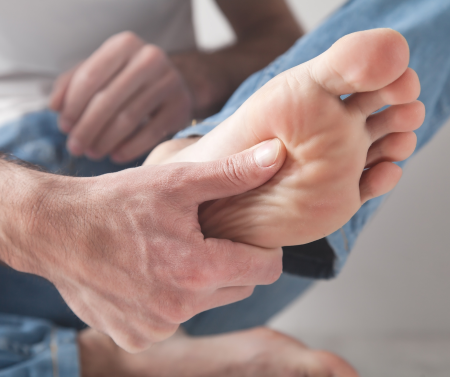
Estimates are about 25% to 30% of people in our country experience peripheral neuropathy. And while it can affect different areas of the body, neuropathy in the feet is one of the most affected areas. Because May is Neuropathy Awareness Month, Dr. Eric Ricefield, Dr. Mark Yagodich, and Dr. Aliza V. Eisen of greater Philadelphia’s Your Next Step Foot and Ankle Care Center are sharing information regarding causes, symptoms and treatment options for this condition.
Peripheral neuropathy occurs when your peripheral nerves are damaged – those that travel to your legs and arms. When this happens, they can’t function properly, resulting in abnormal or decreased sensation, usually in a person’s fingers and toes.
What Causes Neuropathy in the Feet?
The most common cause of neuropathy is diabetes, typically referred to as diabetic neuropathy. In fact, according to the ADA, approximately 60% to 70% of people with diabetes will develop neuropathy.
Some other common causes of neuropathy include:
- Heredity
- Arthritis
- Medications
- Toxins like mercury, arsenic, and lead
- Advanced age
- Alcoholism
- Acute injury to the peripheral nerves
- Toxins like mercury, arsenic, and lead
- Neurological disorders like fibromyalgia and spina bifida
Symptoms of Peripheral Neuropathy
Some of the most common symptoms you are likely to experience if you have neuropathy in the feet are numbness, tingling, stabbing or shooting pain, or burning. Health disorders such as carpal tunnel syndrome can also be a symptom of peripheral neuropathy.
Suppose you detect a change in sensation in your toes or fingers. In that case, it could be a symptom, so be sure to report any abnormal sensations you experience to your podiatrist because they are typically signs of another issue like diabetes.
Neuropathy in The Feet – Treatments You Can Try at Home
Proper Footwear: Wear non-constricting, padded socks to reduce some foot pain. Loose, padded shoes can also help. Diabetic shoes are available in wider widths and have added padding to accommodate the burning and swelling sensations.
OTC Medications: Some common over-the-counter treatments include painkillers like acetaminophen, aspirin, and ibuprofen, which are only temporarily beneficial.
Topical Treatments: Most of these treatments have capsaicin, which comes from chili pepper seeds, and can decrease the ability of nerve cells to communicate pain messages to the brain.
Vitamin Supplements: Vitamin B is important for your nerve health, and a deficiency of it can result in significant nerve damage. Vitamin D – which the body produces when exposed to sunlight – can also help treat your nerve pain.
Lifestyle Adjustments: This might include eating a healthier diet full of lean meats, whole grains, and vegetables. You should also quit smoking and limit your alcohol intake.
Exercise: Exercise decreases blood sugar levels, slowing down or reducing your nerve damage. When you exercise, you will also reduce stress and increase the blood flow to your limbs.
If you think you might be dealing with neuropathy or are ready to find relief from your diagnosed neuropathy, contact the offices of greater Philadelphia’s Your Next Step Foot and Ankle Care Center. Click here to locate the office nearest you and schedule an appointment today.
